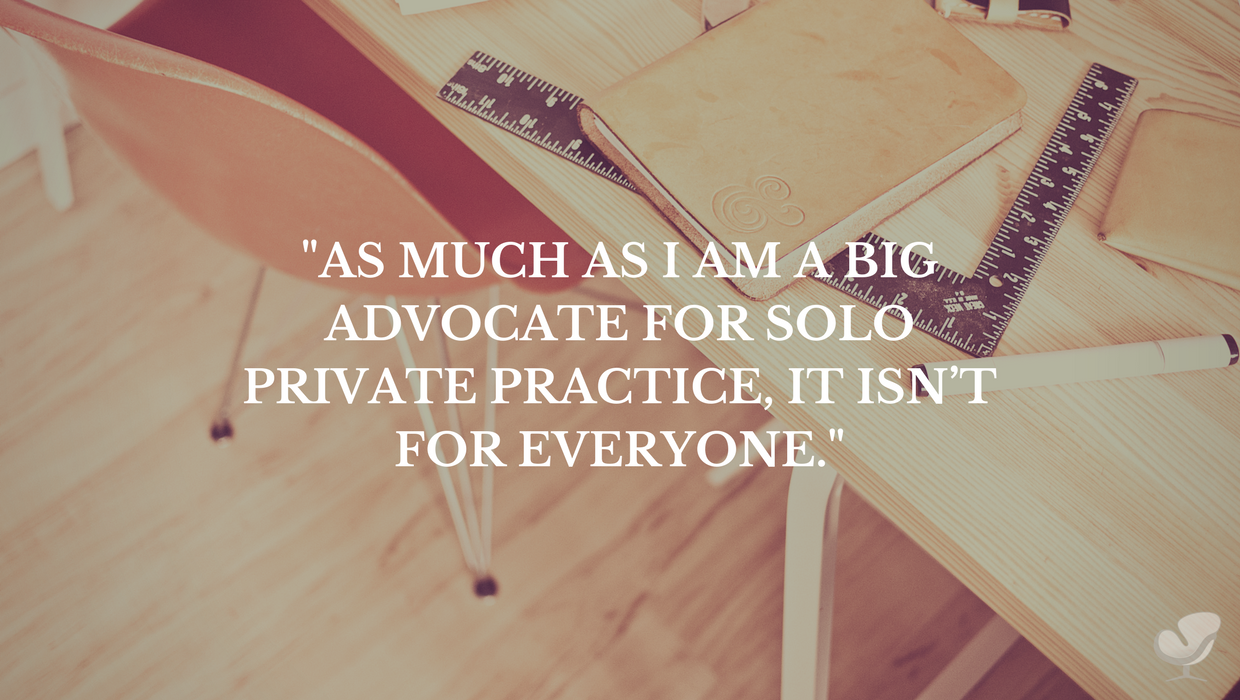A few months ago, I was at my state’s counseling association annual conference, and learned something pretty interesting. According to one source in my state (Tennessee), only 4-5% of the people that are licensed in the mental health field are in private practice. Only 4-5%! I sort of think this is a low estimate. But, even if it were double that, 8-10%, it’s still pretty low.
This Got Me Thinking About Why This Might Be?
The first reason might be, and I hope this is true, that the mental health clinicians that are not in private practice are doing exactly the kind of work they want to be doing. They are working for agencies, hospitals, or the state, and find their work challenging and rewarding. It also provides some financial stability with the benefits they need.
The second reason might be that they are NOT in solo private practice because they don’t know how to start a private practice. Or, the process of getting something like that going just seems overwhelming or intimidating. They do not yet have the knowledge about how to run a business and make that transition into private practice.
The third reason might be that private practice is not even on the radar screen for them. In other words, going into private practice is something they have never considered, or even see as being an option. It has never occurred to them that being in private practice as a mental health clinician is a viable option. It was never presented to them in graduate school as being something to pursue.
Mental Health Clinicians Rock!
How a person decides to practice as a counselor, therapist, psychologist, or other mental health clinician has to fit within their lifestyle and career goals. The good news is that mental health professions are growing. Depending on your niche or specialty, it is a profession that is viable and a great career choice.
According to the Bureau of Labor Statistics, U.S. Department of Labor, Occupational Outlook Handbook, 2016-17 Edition, “Employment of mental health counselors and marriage and family therapists is projected to grow 19% from 2014 to 2024, much faster than the average for all occupations. Growth is expected in both occupations, as more people have mental health counseling services covered by their insurance policies.”
Private Group Practice Might Be The Way To Go
If you are finding that working for a public agency, hospital, or the state is not rewarding or you are getting overwhelmed, going into private practice might just be the thing to explore. Private practice work gives the flexibility and earning potential that agency work tends to limit. And, if you go into private practice, there are two ways to do it. One is to simply go out on your own and start your own solo private practice. The other is to start or join a private practice group.
Advantages Of Joining A Private Group Practice
For most people, when they think of being in private practice, they tend to naturally think about having a solo private practice. And, as much as I am a big advocate for solo private practice, it isn’t for everyone. In fact, for many, a better solution for them in their careers is to consider joining a private group practice. There are several advantages for joining an established private group practice:
- Established referral sources and a steady stream of referrals coming in.
- Usually a sharing of office resources and office space. Having support staff like a receptionist or intake coordinator is sometimes a great perk of a group practice.
- Marketing is usually a group effort and somewhat easier.
- If the group is large enough, sometimes you can have the advantage of benefits such as health insurance and retirement plans.
- Group practices are less isolating and give people a way to have consultations with more difficult cases.
- Group practice also gives clinicians a good opportunity to establish their own specialties and niches.
- For clinicians that are just starting out in private practice, joining a group practice gives you first hand experience in the private practice world. They can also draw on the expertise of other people in the group that are more experienced, or been in it a while.
W-2 Vs.1099
When a person joins a group private practice, how they are compensated for their services can vary. You would join the group as either employed or self-employed. Let me explain.
W-2: Join a Group Practice
One way to join a group practice is to simply be employed by the group practice. With this compensation model, you would receive a salary, or a per case rate, for your services. You would work the hours that the group practice designates and have to follow their expectations as your employer. You would have income tax withholding and possibly some other benefits like workers compensation, health insurance, and disability insurance. The group practice would be required to pay income tax withholding for you. At the end of the year, you would receive a W-2 tax form for your tax filings.
1099: Become An Independent Contractor
Another more common compensation model for many group practices is to be a contracted or “1099” provider for the group. With this business model, you have much more flexibility as an individual and get to set your own hours. With this model clinicians are usually paid a split-fee or some sort of per case rate from the practice. Also, sometimes there is a “membership fee” or “dues” you pay to be part of the group. The key difference is that you are NOT an employee of the practice. You are self-employed; a “1099” independent contractor for hire. You are responsible for paying your own taxes and any benefits you choose to get on your own. At the end of the year, the group practice will give you a 1099 tax form that has to be reported on your taxes.
Both approaches to joining a private group practice have their advantages. And, depending on where you live and the compensation models being used by the group practices in your area, will determine which way you go.
In Conclusion
Regardless of where you might be in your career journey as a mental health clinician, joining a private group practice might just be a great choice for you in your career. I know for me, I turned my solo private practice into a group private practice for many oaf the reasons I have given. But, more than anything, I have always been an advocate for our professions in the mental health field. I also strive to live into an attitude of abundance and collaboration. There is more than enough “business” and work to share. By helping others succeed, we all succeed!
 L. Gordon Brewer, Jr, MEd, LMFT
L. Gordon Brewer, Jr, MEd, LMFT
Gordon is a licensed marital and family therapist in private practice located in Kingsport, TN. He is the owner/president of his group practice Kingsport Counseling Associates, PLLC (www.kingsportcounseling.com). Gordon has been in practice for over 10 years and is also a private practice consultant. His blog and consulting website is www.practiceoftherapy.com. You can also find out more about Gordon at:
- Facebook: https://www.facebook.com/practiceoftherapy/
- Twitter: https://twitter.com/therapistlearn
- Pinterest: https://www.pinterest.com/kptcounseling/
- LinkedIn: https://www.linkedin.com/in/kingsportcounseling

